|
|
|
Sort Order |
|
|
|
Items / Page
|
|
|
|
|
|
|
| Srl | Item |
| 1 |
ID:
125091
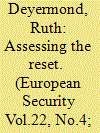

|
|
|
|
|
| Publication |
2013.
|
| Summary/Abstract |
Critics of the Obama administration's 'reset' with Russia claim that it has failed to improve bilateral relations and has conceded too much to Russia at the expense of American interests. In fact, the reset has delivered significant improvements in key areas and established the institutional basis for continued cooperation in the future, benefiting both states. Although disagreements remain on several important issues including missile defence, humanitarian intervention, and democracy, the reset has been broadly successful on its own terms, which were always limited in scope and based on a pragmatic recognition of the limits of possible cooperation. Future progress is uncertain, however - obstacles include differences of national interest; the complicating effects of relations with third party states and the impact of domestic politics. A continuation of the pragmatic approach underpinning the reset represents the best chance for stability in the US-Russia relationship.
|
|
|
|
|
|
|
|
|
|
|
|
|
|
|
|
| 2 |
ID:
116466
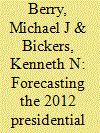

|
|
|
|
|
| Publication |
2012.
|
| Summary/Abstract |
Nearly all forecast models of US presidential elections provide estimates of the national two-party vote (Campbell 2008). Each of the nine forecasts published in the 2008 forecasting issue of PS: Political Science and Politics made national popular vote total predictions for the major party candidates, while only one provided an expected result in the Electoral College (Klarner 2008). These national vote models are assumed to be reliable forecasts of who is likely to win the general election. In most cases, this assumption is reasonable. It becomes problematic, however, at precisely the point that forecasts are most interesting: when elections are close. In tight elections, national forecasts can and have produced a "winner" different from the actual winner. Consider the forecasts and ultimate outcome of the 2000 election. Each of the 2000 presidential election forecasts predicted vice president Al Gore to win a majority of the two-party popular vote, which he did, but none correctly predicted governor George W. Bush to assume the presidency (Campbell 2001). Never in US history have White House residents been determined through a national popular vote. Presidential elections are decided through contests in the states and the District of Columbia. The forecast model we developed explicitly models the presidential contest based on factors inherent to these 51 jurisdictions. This modeling approach allows us to make a projection of the Electoral College result, which popular vote estimates cannot.
|
|
|
|
|
|
|
|
|
|
|
|
|
|
|
|
| 3 |
ID:
175836
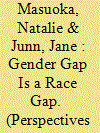

|
|
|
|
|
| Summary/Abstract |
Scholarship on women voters in the United States has focused on the gender gap, showing that, since the 1980s, women are more likely to vote for Democratic Party candidates than men. The persistence of the gender gap has nurtured the conclusion that women are Democrats. This article presents evidence upending that conventional wisdom. It analyzes data from the American National Election Study to demonstrate that white women are the only group of female voters who support Republican Party candidates for president. They have done so by a majority in all but 2 of the last 18 elections. The relevance of race for partisan choice among women voters is estimated with data collected in 2008, 2012, and 2016, and the significance of being white is identified after accounting for political party identification and other predictors.
|
|
|
|
|
|
|
|
|
|
|
|
|
|
|
|
| 4 |
ID:
131648
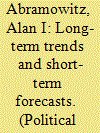

|
|
|
| 5 |
ID:
116456
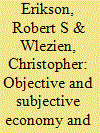

|
|
|
|
|
| Publication |
2012.
|
| Summary/Abstract |
The importance of the economy in US presidential elections is well established. Voters reward or punish incumbent party candidates based on the state of the economy. The electorate focuses particularly on economic change, not the level of the economy per se, and pays more attention to late-arriving change than earlier change. On these points there is a good amount of scholarly agreement (see e.g., Erikson and Wlezien 1996; Hibbs 1987). There is less agreement, however, on what specific indicators matter to voters. Some scholars rely on income growth, others on GDP growth, and yet others on subjective perceptions (see Abramowitz 2008; Campbell 2008; Holbrook 1996b; also see Campbell and Garand 2000). In our work, we have used the index of leading economic indicators, a composite of ten variables, including the University of Michigan's index of consumer expectations, stock prices, and eight other objective indicators.
|
|
|
|
|
|
|
|
|
|
|
|
|
|
|
|
| 6 |
ID:
149331
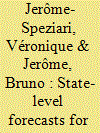

|
|
|
| 7 |
ID:
142817
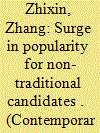

|
|
|
|
|
|
|
|